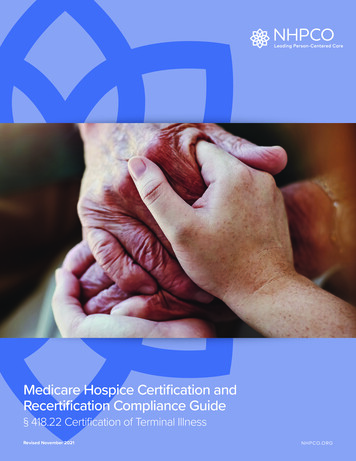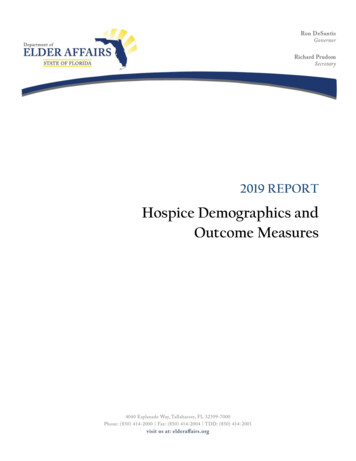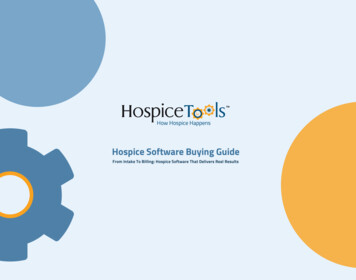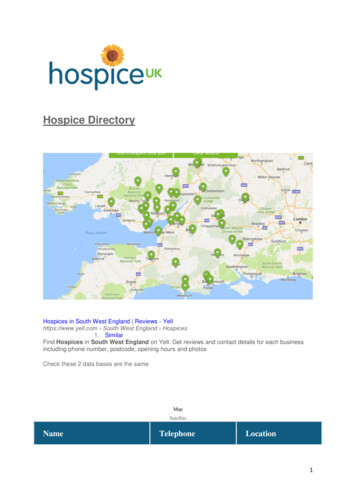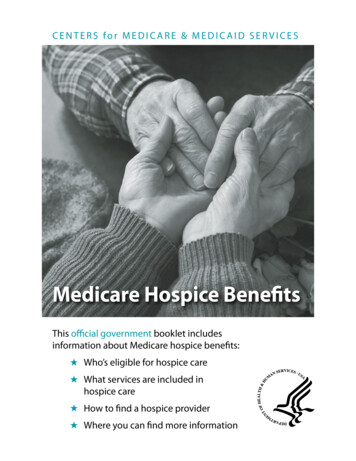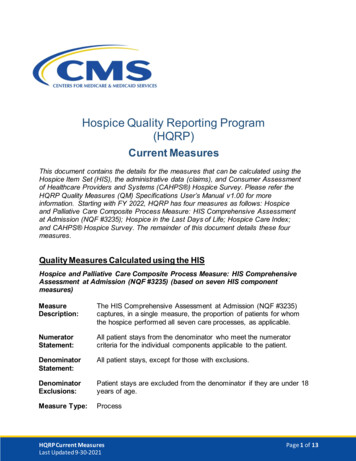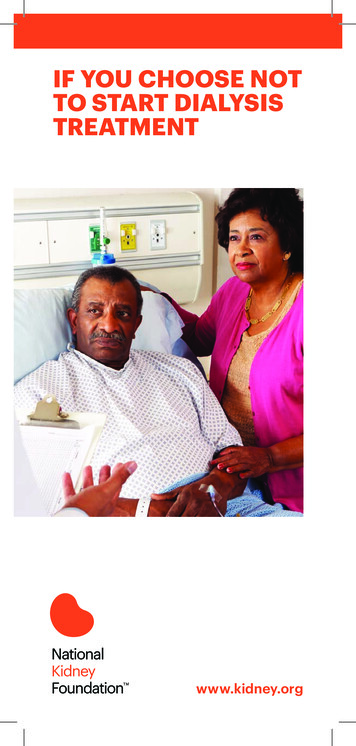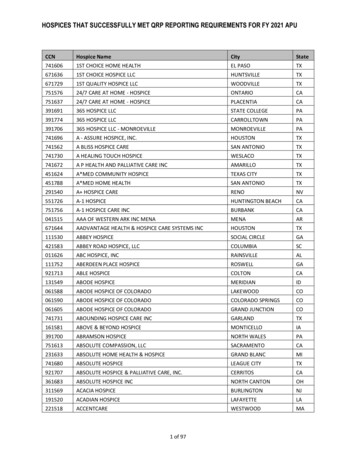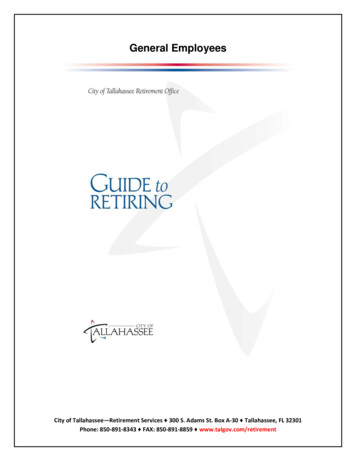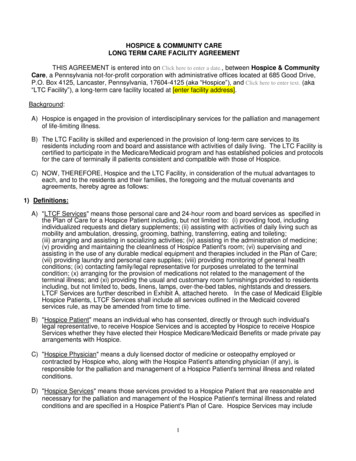
Transcription
CrosswalkbetweenMedicare Hospice CoPs and DPH State Hospice Licensure RegulationsApril 2009Reference WebsitesCoPs 2008Medicare Conditions of Participation for Hospice Care 42 CFR418 05.pdfState Operations ManualCMS State Operations Manual; Interpretive Guidelines, Hospice, Interim Version 1.1 enInfo/downloads/SCLetter09-19.pdfMass DPH State Licensure RegulationsMass. Department of Public Health, Chapter 141.000: Licensure of Hospice Programs pice reg final 03.pdfMass HealthMass Division of Medical Assistance, Hospice Provider Manual , /regs provide/regs hospice.pdfNHPCONational Hospice and Palliative Care Organizationhttp://www.nhpco.orgHospice & Palliative Care Federation of Massachusetts1420 Providence Highway, Suite 277, Norwood, MA 02062-4662phone - 781.255.7077 fax - 781.255.7078e-mail- hospicefed@aol.comwebsite - www.hospicefed.orgH&PCFM thanks VNA Hospice Care's Executive Director Diane Bergeron and Quality/Regulatory Compliance Specialist Julia Anne Walsh for sharing this crosswalk with Federation members
141.207418.20 Eligibility requirementsIn order to be eligible to elect hospice care under Medicare, an individual must be(a) Entitled to Part A of Medicare(b) Certified as being terminally illin accordance with Sec, 418.22418.21Duration of hospice care coverage—Election periods(a) Subject to the conditions setforth in this part,(1) An initial 90-day period;an individual may elect to receivehospice care during(2) A subsequent 90-day period; orone or more of the followingelection periods(3) An unlimited number of subsequent 60-day periods.141.208 (A)(3)418.22 Certification of terminal illnessa) Timing of certification(b) Content of Certification.Certification will be based on thephysician’s or medical director’sclinical judgment regarding thenormal course of the individual'sillness. The certification mustconform to the followingrequirements:(c) Sources of certification(d) Maintenance of records.Hospice staff must--1) General rule. The hospice must obtain written certification of terminal illness for each of the periodslisted in 418.21, even if a single election continues in effect for an unlimited number of periods, asprovided in 418.24 C.(2) Basic requirement. Except as provided in paragraph (a)(3) of this section, the hospice must obtainthe written certification before it submits a claim for payment(3) Exception. If the hospice cannot obtain the written certification within 2 calendar days, after aperiod begins, it must obtain an oral certification within 2 calendar days and the written certificationbefore it submits a claim for payment(1) The certification must specify that the individual’s prognosis is for a life expectancy of 6 months orless if the terminal illness runs its normal course437.4112) Clinical information and other documentation that support the medical prognosis must accompanythe certification and must be filed in the medical record with the written certification as set forth inparagraph (d) (2) of this section. Initially, the clinical information may be provided verbally, and must bedocumented in the medical record and included as part of the hospice's eligibility assessment.(1) For the initial 90-day period, the hospice must obtain written certification statements (and oralcertification statements if required under paragraph (a)(3) of this section) from -(i) The medical director of the hospice or the physician member of the hospice interdisciplinary group;and(ii) The individual's attending physician if the individual has an attending physician(2) For subsequent periods, the only requirement is certification by one of the physicians listed inparagraph C)(1)(i) of this section1) Make an appropriate entry in the patient's medical record as soon as they receive an oralcertification; and2 )File written certifications in the medical record.141.207 C(3)Key DifferencesMass HealthMass. DPHRegulationsMedicare CoP's 2008State Ops Manual,Ver 1.1Regulatory Crosswalk
141.205 (A)(B)418.24 Election of hospice care(a) Filing an election statement.An individual who meets theeligibility requirement of Sec.418.20 may file an electionstatement with a particularhospice. If the individual isphysically or mentallyincapacitated, his or herrepresentative (as defined in sec.418.30) may file the electionstatement437.412450.1051) Identification of the particular hospice that will provide care to the individual.(b) Content of election statement. 2) The individual's or representative's acknowledgement that he or she has been given a fullThe election statement mustunderstanding of the palliative rather than curative nature of hospice care, as it relates to theinclude the following:individual's terminal illness3) Acknowledgement that certain Medicare services, as set forth in paragraph (d) of this section, arewaived by the election4) The effective date of the election, which may be the first day of hospice care or a later date, but maybe no earlier than the date of the election statement5) The signature of the individual or representative1) Remains in the care of a hospice, and(c) Duration of election. An(2) Does not revoke the election under the provisions of Sec.418.28election to receive hospice carewill be considered to continuethrough the initial election periodand through the subsequentelection periods without a break incare as long as the individual(1) Hospice care provided by a hospice other than the hospice designated by the individual (unless(d) Waiver of other benefits. Forprovided under arrangements made by the designated hospicethe duration of an election ofhospice care, an individual waivesall rights to Medicare payments forthe following services:(2) Any Medicare services that are related to the treatment of the terminal condition for which hospicecare was elected or a related condition or that are equivalent to hospice care except for services (i) Provided by the designated hospice:(ii) Provided by another hospice under arrangements made by the designated hospice; andProvided by another hospice under arrangements made by the designated hospice; and(iii) Provided by the individual's attending physician if that physician is not an employee of thedesignated hospice or receiving compensation from the hospice for those servicesKey DifferencesMass HealthMass. DPHRegulationsState Ops Manual,Ver 1.1Medicare CoP's 2008
Key DifferencesMass HealthMass. DPHRegulationsState Ops Manual,Ver 1.1Medicare CoP's 2008(e) Re-election of hospicebenefits. If an election has beenrevoked in accordance with Sec.418.28, the individual (or his orher representative if the individualis mentally or physicallyincapacitated) may at nay time filean election, in accordance withthis section, for any other electionperiod that is still available to theindividual418.25Admission to hospice carea) The hospice admits a patientonly on the recommendation ofthe medical director inconsultation with, or with inputfrom, the patient's attendingphysician (if any).b) In reaching a decision to certifythat the patient is terminally ill, thehospice medical director mustconsider at least the followinginformation:141.208437.411 DPH has specific language regarding437.112 admission policies and procedures1) Diagnosis of the terminal condition of the patient2) Other health conditions, whether related or unrelated to the terminal condition3) Current clinically relevant information supporting all diagnosesL 682418.26 Discharge from hospice carea) Reasons for discharge. A1) The patient moves out of the hospice's service area or transfers to another hospice:hospice may discharge a patient if2) The hospice determines that the patient is no longer terminally ill; or3) the hospice determines, under a policy set by the hospice for the purpose of addressing dischargefor cause that meets the requirements of paragraphs (a) (3) (i) through (a) (3)(iv) of this section, thatthe patient's (or other persons in the patient's home) behavior is disruptive, abusive, or uncooperativeto the extent that delivery of care to the patient or the ability of the hospice to operate effectively isseriously impaired. The hospice must do the following before it seeks to discharge a patient for cause:(i) Advise the patient that a discharge for cause is being considered;(ii) Make a serious effort to resolve the problem(s) presented b y the patient's behavior or situation;(iii) Ascertain that the patient's proposed discharge is not due to the patient's use of necessary hospiceservices; and141.207141.209Code of Federal Regulations 624 (b) (2)
Mass. DPHRegulationsMass HealthL 683141.209437.412(C) (2)(iv) Document the problem(s) and efforts made to resolve the problem(s) and enter this documentationinto its medical recordsb) Discharge order. Prior todischarging a patient for anyreason listed in paragraph (a) ofthis section, the hospice mustobtain a written physician'sdischarge order from the hospicemedical director. If a patient hasan attending physician involved inhis or her care, this physicianshould be consulted beforedischarge and his or her reviewand decision included in thedischarge note.(1) Is no longer covered under Medicare for hospice care;c) Effect of discharge. Anindividual, upon discharge fromthe hospice during a particular(2) Resumes Medicare coverage of the benefits waived under 418.24(d); andelection period for reasons otherthan immediate transfer to anotherhospice (3) May at any time elect to receive hospice care if he or she is again eligible to receive the benefit(1) The hospice must have in place a discharge planning process that takes into account the prospectd) Discharge planningthat a patient's condition might stabilize or otherwise change such that the patient cannot continue tobe certified as terminally ill(2) The discharge planning process must include planning for any necessary family counseling, patienteducation, or other services before the patient is discharged because he or she is no longer terminallyill418.28 Revoking the election of hospice carea) An individual or representativemay revoke the individual'selection of hospice care at anytime during an election period1) A signed statement that the individual or representative revokes the individual's election forb) To revoke the election ofMedicare coverage of hospice care for the remainder of that election periodhospice care, the individual orrepresentative must file astatement with the hospice thatincludes the following information: 2) The date that the revocation is to be effective. (An individual or representative may not designate aneffective date earlier than the date that the revocation is made)c) An individual, upon revocationof the election of Medicarecoverage of hospice care for aparticular election period --1) Is no longer covered under Medicare for hospice care;2) Resumes Medicare coverage of the benefits waived under Sec. 41824(e)(2); and3) May at any time elect to receive hospice coverage for any other hospice election periods that he orshe is eligible to receiveKey DifferencesState Ops Manual,Ver 1.1Medicare CoP's 2008
418.30 Change of the designated hospicea) An individual of representativemy change, once in each electionperiod, the designation of theparticular hospice from whichhospice will be receivedb) The change of the designatedhospice is not a revocation of theelection for the period in which it ismadeKey DifferencesMass HealthMass. DPHRegulationsState Ops Manual,Ver 1.1Medicare CoP's 2008141.207 C(3)141.209437.412(C) (3)L6821) The name of the hospice from which the individual has received care and the name of the hospicec) To change the designation ofhospice programs, the individual from which he or she plans to receive care2) The date the change is to be effectiveor representative must file, withthe hospice from which care hasbeen received and with the newlydesignated hospice, a statementthat includes the followinginformation:418.52 Patient's rightsThe patient has the right to be informed of his or her rights, and the hospice must protect and promote the exercise of these rights.a) Notice of rights and1) During the initial assessment visit in advance of furnishing care the hospice must provide theresponsibilitiespatient or representative with verbal (meaning spoken) and written notice of the patient's rights andresponsibilities in a language and manner that the patient understandsL500-L519L 501L bus Budget Reconcilliation Act (OBRA)1990 - PL 101 - 508Civil Rights Act, Title VI, Section 601, 1964 45 CFR 80.3 (b) (2)HHS Tile VI Guidance of Limited EnglishProficiency - 68 FR 48311 (8/2003)Medicare Claims Processing Manual,Chapter 30- Financial Liability Protections(Rev)CMSTransmittal R1587CP, Change Request6135, 09/05/09, Revised Form CMS-R-131Advance Beneficiary Notice of Non-coverage,Effective date 03/03/08, Implementation date03/01/09Social Security Act - Section 1879 Limitationon Liability ProvisionsNHPCO Advance Beneficiary Notice Form(CMS-R-131) Tip Sheet
2) The hospice must comply with the requirements of subpart 1 of part 489 of thischapter regarding advance directives. The hospice must inform and distribute writteninformation to the patient concerning its policies on advance directives, including adescription of applicable State lawL504b) Exercise of rights and respect1) The patient has the right:L505for property and personi) To exercise his or her rights as a patient of the hospiceii) To have his or her property and person treated with respectiii) To voice grievances regarding treatment or care that is (or fails to be furnished and the lack ofrespect for property by anyone who is furnishing services on behalf of the hospice; andiv) To not be subjected to discrimination or reprisal for exercising his or her rights2) If a patient has been adjudged incompetent under state law by a court of proper jurisdiction, therights of the patient are exercised by the person appointed pursuant to state law to act on the patient'sbehalf141.201 (G)L506L5074) The hospice must:i) Ensue that all alleged violations involving mistreatment, neglect, or verbal, mental, sexual, andphysical abuse, including injuries of unknown source, and misappropriation of patient property byanyone furnishing services on behalf of the hospice, are reported immediately by hospice employeesand contracted staff to the hospice administrator;L508iii) take appropriate corrective action in accordance with state law if the alleged violation is verified bythe hospice administration or an outside body having jurisdiction, such as the State survey agency orlocal law enforcement agency; and141.205141.201 F3) If a state court has not adjudged a patient incompetent, any legal representative designated by thepatient in accordance with state law may exercise the patient's rights to the extent allowed by state lawii) Immediately investigate all alleged violations involving anyone furnishing services on behalf of thehospice and immediately take action to prevent further potential violations while the alleged violation isbeing verified. Investigations and/or documentation of all alleged violations must be conducted inaccordance with established procedures;Key DifferencesClarification from CMS IG - If the hospicehas a policy not to certify staff for CPR and thepatient does not have a DNR order, the patientmust be informed of what procedure will beoccur should resuscitation be neededPatient Self Determination Act 1995 489.102Mass Health Care Proxy/Care and ComfortLegislation - 201 B, DMass Health Legislation for Health CareProxy - 130 CMR 501L5033) The hospice must obtain the patient's or representative's signature confirming that he or she hasreceived a copy of the notice of rights and responsibilitiesMass HealthMass. DPHRegulationsState Ops Manual,Ver 1.1Medicare CoP's 2008141.201 F, G141.204 (F)155.000L509L510Clarification of CMS IG - Violations ofpatients rights must immediately be
c) Rights of the patientiv) Ensure that verified violations are reported to State and local bodies having jurisdiction (including tothe State survey and certification agency) within five (5) working days of becoming aware of theviolationL511The patient has a right to the following :1) Receive effective pain management and symptom control from the hospice for conditions related tothe terminal illness;L5122) Be involved in developing his or her hospice plan of care;L5135) Have a confidential clinical record. Access to or release of patient information and clinical records ispermitted in accordance with 45 CFR parts 160 and 1646) Be free from mistreatment, neglect, or verbal, mental, sexual, and physical abuse, including injuriesof unknown source, and misappropriation of patient property;7) Receive information about the services covered under the hospice benefit8) Receive information about the scope of services that the hospice will provide and specific limitationson those services418.54 Initial & Comprehensive Assessment of the PatientThe hospice must conduct and document in writing a patient-specific comprehensive assessment that identifies the patient's need forhospice care and services, and the patient's need for physical, psychosocial, emotional, and spiritual care. This assessment includes allareas of hospice care related to the palliation and management of the terminal illness and related conditions.141.205141.203141.205 (A)(4)141.206 (C)(6)L514L515141.205 (A)(3)L516141.205 (A)(2)141.209 ),(B), (D)L520141.202L521Key Differencespatients rights must immediately beinvestigated and reported to the hospiceadministrator and if verified, be reported tostate and local authorities with five (5) days3) Refuse care or treatment;4) Choose his or her attending physician;Mass HealthMass. DPHRegulationsState Ops Manual,Ver 1.1Medicare CoP's 2008Clarification of CMS IG - If one discipline,e.g. chaplain or volunteer, is consistentlyrefused, the surveyor may look at how theservices are presented to the patient andfamily.
a) Initial AssessmentThe RN must complete an initial assessment within 48 hours after the election of hospice care inaccordance with 418.24 is complete (unless the physician, patient, or representative requests that theinitial assessment be completed in less than 48 hoursHospice interdisciplinary group, in consultation with the individual's attending physician (if any) mustb) Timeframe for completion of thecomplete the comprehensive assessment no later than 5 calendar days after the election of hospicecomprehensive assessmentcare in accordance with 418.24c) Content of the comprehensiveassessmentComprehensive assessment must identify the physical, psychosocial, emotion, and spiritual needsrelated to the terminal illness that must be addressed in order to promote the hospice patient's wellbeing, comfort, and dignity throughout the dying process. The comprehensive assessment must takeinto consideration the following factors:L522L523L524(1) The nature and condition causing admission (including the presence or lack of objective data andsubjective complaints.L5252) Complications and risk factors that affect care planning.L526141.202141.204 D) (4)141.202141.203Key DifferencesMass HealthMass. DPHRegulationsState Ops Manual,Ver 1.1Medicare CoP's 2008CoPs require Initial Assessment to bedeveloped within forty-eight (48) hours of theelection of the hospice benefit which a strictertime frame than Mass DPH. Additionally,Mass DPH requires that 1) the initial POCshall be developed by at least three (3)members of the IDT, including a RN and themedical director, and 2) the Initial POC shallbe reviewed and ratified by the full IDT at theirnext scheduled meeting.Clarification of CMS IG - 1) The InitialAssessment must be completed within fortyeight (48) hours from the effective date of theNotice of Election; 2) This is not including a"meet and greet" visit and; 3) The InitialAssessment must be completed in the locationwhere the hospice services are to bedelivered.Clarification of CMS IG - 1) TheComprehensive Assessment must becompleted in five (5) calendar days from theeffective date of the Notice of Election; 2) theComprehensive Assessment should be aninterdisciplinary process; 3) The RN is thecoordinator but should not be completing theassessment in a vacuum; 4) There should beevidence that the IDT is actively involved inevaluating patient care; 5) The hospice mustshow that the patient and family have beenassessed to update the Plan of Care. If nochanges were noted, then that should bedocumented and; 6) The hospice must includedata elements that allow for outcomemeasurements, e.g. pain, dyspnea, nausea,spiritual needs, and emotional distress.Change from previous draft of CMS StateOps Manual - Addition of "the assessmentand screening, the hospice would then gatheradditional information to be able to meetpatient/family needs. They suggest usingClinical Standards of Practice to guide datacollection.
Mass Health141.204 (G)(3)437.423(D) (1)Key DifferencesMass. DPHRegulationsState Ops Manual,Ver 1.1Medicare CoP's 2008L5273) Functional status, including the patient's ability to understand and participate in his or her own care.4) Imminence of death.5) Severity of symptoms.6) Drug Profile. A review of all the patient's prescription and over-the-counter drugs, herbal remediesand other alternative treatments that could affect drug therapy. This includes, but is not limited to,identification of the following:L528L529L530(i) Effectiveness of drug therapy.(ii) Drug side effects.(iii) Actual or potential drug interactions.(iv) Duplicate drug therapy.(v) Drug therapy currently associated with laboratory monitoring.7) Bereavement. An Initial bereavement assessment of the needs of the patient's family and otherindividuals focusing on the social, spiritual, and cultural factors that may impact their ability to cope withthe patient's death. Must be incorporated into the plan of care and considered in the bereavement planof care.L5318) Need for referrals and further evaluation by appropriate health professionals.The RN must complete an initial assessment within 48 hours after the election of hospice care updateof the comprehensive assessment must be accomplished by the hospice interdisciplinary group (incollaboration with the individual's attending physician, if any) and must consider changes that have(d) Update of the comprehensivetaken place since the initial assessment. It must include information on the patient's progress towardassessmentdesired outcomes, as well as a reassessment of the patient's response to care. The assessmentupdate must be accomplished as frequently as the condition of the patient requires, but no less thanevery 15 days.L532(1) The comprehensive assessment must include data elements that allow for measurement ofoutcomes. The hospice must measure and document data in the same way for all patients. The dataelements must take into consideration aspects of care related to hospice and palliation.L534(e) Patient Outcome Measures(2) The data elements must be an integral part of the comprehensive assessment and must bedocumented in a systematic and retrievable way for each patient. The data elements for each patientmust be used in individual patient care planning and in the coordination of services, and must be usedin the aggregate for the hospice's quality assessment and performance improvement program.418.56 Interdisciplinary group, care planning, and coordination of servicesL533141.202CoP's contain more specific languageregarding the Comprehensive Assessment should be updated no less frequently thanevery fifteen (15) days.141.203 B)(5)(6)Clarification of CMS IG - 1) Documentationmust verify IDT participation includingL535L536
The hospice must designate an interdisciplinary group or groups as specified in paragraph (a) of this section which, in consultation withthe patient's attending physician, must prepare a written plan of care for each patient. The plan of care must specify the hospice care andservices necessary to meet the patient and family-specific needs identified in the comprehensive assessment as such needs relate to theterminal illness and related conditions.a) Approach to service delivery1) The hospice must designate an interdisciplinary group or groups composed of individuals who worktogether to meet the physical, medical, psychosocial, emotional, and spiritual needs of the hospicepatients and families facing terminal illness and bereavement. Interdisciplinary group members mustprovide the care and services offered by the hospice, and the group, in its entirety, must supervise thecare and services. The hospice must designate a registered nurse that is a member of theinterdisciplinary group to provide coordination of care and to ensure continuous assessment of eachpatient's and family's needs and implementation of the interdisciplinary plan of care. Theinterdisciplinary group must include, but is not limited to, individuals who are qualified and competent topractice in the following professional roles:(i) A doctor of medicine or osteopathy (who is an employee or under contract with the hospice)L537, L538141.203L539, L540141.203 A)(3)(6)141.203 CAttending MD; 2) CMS views the Plan of Careas the most important document in hospice,Signatures of all IDT members are notrequired but there must be documentation ofcollaboration, i.e. each IDT members signs theforms; 3) Narrow ranges for services areappropriate but should never use zero (0) as arange unless accompanied by a visit range.PRN is permitted but only when there is also arange provided; 4) standing orders must beindividualized and signed by the patient'sattending MD; 5) Documentation of how(phone, email) the attending MD wascommunicated with is important, and; 6) Oneof the top ten (10) deficiencies was failing tohave systems in place to facilitate exchange ofinformation and coordination of servicesbetween hospice and non-hospice staff.L541(ii) A registered nurse141.204 e) (6)(iii) A social worker(iv) A pastoral or other counselor2) If the hospice has more than one interdisciplinary group, it must identify a specifically designatedinterdisciplinary group to establish policies governing the day-to-day provision of hospice care andservices.b) Plan of Carec) Content of the plan of careAll hospice care and services furnished to patients and their families must follow an individualizedwritten plan of care established by the hospice interdisciplinary group in collaboration with the attendingphysician (if any), the patient or representative, and the primary caregiver in accordance with thepatient's needs if any of them so desire. The hospice must ensure that each patient and the primarycare giver(s) receive education and training provided by the hospice as appropriate to theirresponsibilities for the care and services identified in the plan of care.The hospice must develop an individualized written plan of care for each patient. The plan of care mustreflect patient and family goals and interventions based on the problems identified in the initial,comprehensive, and updated comprehensive assessments. The plan of care must include all servicesnecessary for the palliation and management of the terminal illness and related conditions, includingthe following:1) Interventions to manage pain and symptomsL542L543, L544141,202 B141.203 (B)(3)141.207 (C)(8)L545141.202 C(1,2,3,6,7,8,9,10) 141.203L546Key DifferencesMass HealthMass. DPHRegulationsState Ops Manual,Ver 1.1Medicare CoP's 2008437.422
2) A detailed statement of the scope and frequency of services necessary to meet the specific patientand family needs3) Measurable outcomes anticipated from implementing and coordinating the plan of care4) Drugs and treatment necessary to meet the needs of the patientd) Review of the plan of caree) Coordination of services5) Medical supplies and appliances necessary to meet the needs of the patient6) The interdisciplinary group's documentation of the patient's or representative's level ofunderstanding, involvement, and agreement with the plan of care, in accordance with the hospice'sown policies, in the clinical record.The hospice interdisciplinary group (in collaboration with the individual's attending physician, if any)must review, revise and document the individualized plan as frequently as the patient's conditionrequires, but no less frequently than every 15 calendar days. A revised plan of care must includeinformation from the patient's updated comprehensive assessment and must note the patient'sprogress toward outcomes and goals specified in the plan of careThe hospice must develop and maintain a system of communication and integration, in accordancewith the hospice's own policies and procedures, to1) Ensure that the interdisciplinary group maintains responsibility for directing, coordinating, andsupervising the care and services provided2) Ensure that the care and services are provided in accordance with the plan of care3) Ensure that the care and services provided are based on all assessments of the patient and familyneeds4) Provide for and ensure the ongoing sharing of information between all disciplines providing care andservices in all settings, whether the care and services are provided directly or under arrangement5) Provide for an ongoing sharing of information with other non-hospice healthcare providers furnishingservices unrelated to the terminal illness and related conditions418.58 Quality assessment and performance improvementThe hospice must develop, implement, and maintain an effective, ongoing, hospice-wide data-driven quality assessment and performanceimprovement program. The hospice's governing body must ensure that the program: Reflects the complexity of its organization andservices;
Medicare Hospice CoPs and DPH State Hospice Licensure Regulations April 2009 Hospice & Palliative Care Federation of Massachusetts 1420 Providence Highway, Suite 277, Norwood, MA 02062-4662 phone - 781.255.7077 fax - 781.255.7078 Crosswalk Medicare Conditions of Participation for Hospice Care 42 CFR418 (2008)
